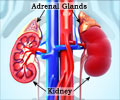Symptoms and Diagnosis
Adrenocortical carcinoma with functional tumors involves hormonal dysfunction and is characterized by –
- Cushing’s syndrome – due to High serum Cortisol Levels,
- Conn syndrome - due to high Aldosterone levels
- Virilization or feminization – due to high levels of testosterone in women and oestrogen in men.
Adrenocortical carcinoma presents itself differently in children (virilization - presenting symptom) and adults (Cushing’s syndrome-presenting symptom).
The prominent symptoms and signs of Adrenocortical carcinoma are -
Cushing syndrome - due to increased cortisol levels or glucocorticoids.
- weight gain,
- purple lines on abdomen,
- muscle wasting,
- fatty ‘buffalo’ hump on neck, thin fragile skin,
- ‘moon-like’ face - flushed rounded face with pudgy cheeks
Conn syndrome due to High levels of Aldosterone or mineralocorticoids-
- High Blood Pressure
- Headache,
- Hypokalemia (low potassium),
- Muscle weakness,
- Palpitations
- Confusions
- Increased thirst
- Increased urination
Virilism - due to androgen or testostosterone excess – affects women
- Acne,
- Excess facial and body hair,
- Enlarged clitoris,
- Coarse facial features,
- Deep voice,
- Menopause
Feminization - due to estrogen excess seen in men -
- Breast enlargement,
- Low libido,
- Impotence
Non-functional carcinomas can present as abdominal mass and flank pain. They can often present late. They are often detected on routine investigations such as ultrasound.
Pathobiology / Causes
The main cause of adrenocortical cancer is unknown. However several causes are implicated.
- A family history of Fraumeni syndrome generates an increased risk
- Tumor suppressor genes such as p53 and RB(retinoblastoma) protein are altered.
- The expressions of genes h19 and insulin-like growth factor II ( essential for fetal development) are decreased and increased respectively.
- The expression of the c-myc gene is relatively high in these cancers and is associated with poor prognosis.
Diagnosis
Diagnosis of adrenocortical cancer is based on the following tests -
- Blood Pressure is High
- Serum Cortisol levels are High
- Serum Aldosterone level is High
- Serum ACTH level is Low
- Serum Potassium is Low
- CT scan of the abdomen
- Abdominal MRI
Microscopic examinations of biopsied samples confirms the diagnosis.









